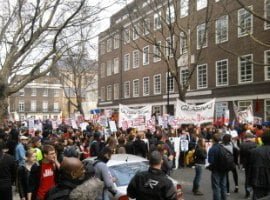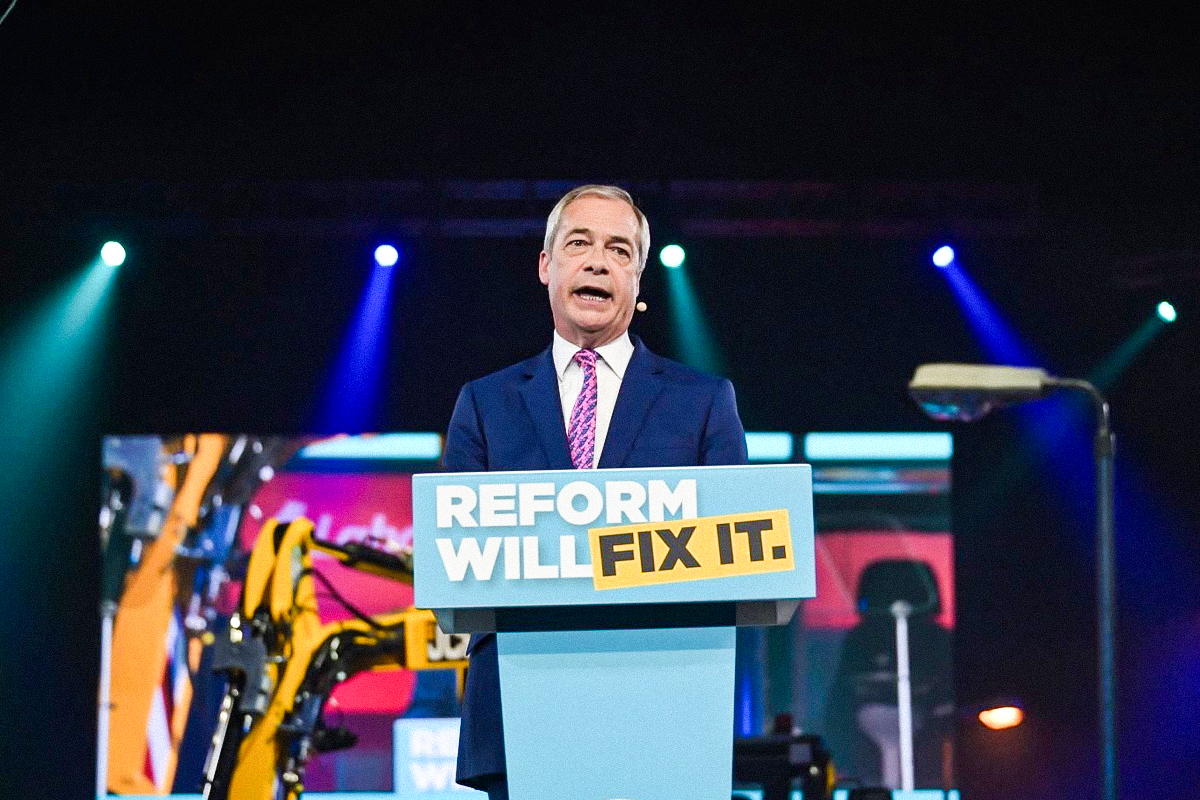University of London Union (ULU), a body representing over 120,000 students from almost 20 colleges in London, is facing dissolution after a decision taken at a University of London (UoL) Collegiate Council meeting on the morning of Friday 3rd May. This attack on the democratic structures and campaigning organisations of London students must be fought.
University of London Union (ULU), a body representing over 120,000 students from almost 20 colleges in London, is facing dissolution after a decision taken at a University of London (UoL) Collegiate Council meeting on the morning of Friday 3rd May.
UoL Collegiate Council, the federal university’s academic governing body, has resolved to give its backing to a report produced by the ULU Review Group, which was commissioned by UoL to assess the work of the Union and had been conducting its investigation since September 2012. It must be mentioned that the Review Group had no student representatives on it, and throughout the whole process student officers had played consultative roles at most.
The report recommends that ULU be abolished as a representative student body, together with its elected sabbatical officers and all campaigning functions, by summer 2014. It suggests a replacement in the form of a “Student Services Centre”, which would take over the Malet Street building and keep its bars, cafes, and, to quote the document, other “income-generating” and “financially sustainable” services, which are now to be run by unelected UoL management.
Most of ULU’s clubs and societies will suffer, with all but the biggest and the “elite” ones likely to face closure. ULU’s newspaper, “London Student”, which is Europe’s largest student publication, is mentioned in the document (referred to as a “traditional but costly media outlet”), but its fate is not clear. However, it would not be surprising if the Editor, currently being a full-time elected position, will be appointed by managerial decision, if not altogether abolished with the newspaper, along with other democratic structures. One can hardly imagine the benchmark of over 300 students contributing to the paper per term, which was set this year, to be continued in case ULU is abolished.
Among the reasons for such a decision, the report cites the low turnout (under 2%) in recent ULU elections as indicative of its failure to fulfil its representative role. While it is true that low participation is a problem that the Union needs to tackle, the report arbitrarily dismisses improvement is this area in the recent years as “ad hominem and fragile”. One can only wonder what improvement can be brought by the abolition of the Union.
As regards the societies and sport clubs, it is argued that those in ULU are, for the most part, duplicated in the constituent colleges’ respective student unions and are therefore unnecessary. One struggles to envision the management seeing a use for virtually any of the current ULU societies; especially since the report dismisses sports, usually championed for capital investment because of their promoting value, as “duplicated in the constituent colleges”. This notion simply isn’t true – most ULU sports teams offer places only to the highest-level student participants from across London, making many of them the only worthwhile option for London students looking to compete at national and elite levels.
The Review Group recommended that students from the smaller universities seek provision of clubs and societies services from their bigger neighbouring counterparts. In a more general sense, the report implies that the apparent solution of its authors, and of the arbiters at the head of UoL, is to make the students of these smaller colleges reliant upon the unions of the several largest college unions in London. Such an implication appeals to the expansionist tendencies we have already seen, evident especially at UCL, in recent years, and deepens the sense that smaller colleges in London are merely the satellites of their larger counterparts without an academic and social identity of their own. The impotence, small scale and scant financing of student representative bodies for the smaller UoL constituent colleges makes ULU fundamentally necessary to the students of these colleges; it is the only real means through which they can defend themselves against the austerity rife, not only in education, but also in other areas which affect students, such as housing and living costs.
Unsurprisingly, the most important place in the commission’s findings was given to the issue of funding. It is clear that UoL’s biggest concern is “financial sustainability” and “un-budgeted [and] trading losses”, and boldly states that “financial assumptions… will be based on commercial income-earning”. This is further confirmed by the fact that it is mostly the profitable services, such as bars and cafes, that are being kept; hypocritically so, because if the commission was to follow its stated principle of “avoiding duplication of commonly available provision”, most recreational services would have been scrapped along with clubs and societies.
This is part of a general trend of increasing profiteering and marketisation in higher education. UCL, which is a constituent UoL institution, has recently announced the so-called Bloomsbury Masterplan, which sets out the intention to open up the campus for commercially run catering providers, including up to ten new cafes such as Costa and Starbucks, while at the same time cutting academic staff and merging departments and libraries; the university also actively seeks funding from private arms manufacturing companies. There can be little doubt that ULU services, likewise, will be increasingly outsourced and opened up to private businesses, with consequent price rises, should unaccountable management take over. The recent 3 Cosas Campaign – a successful struggle of outsourced workers, aided by ULU, for wages, sick pay and pensions – has exposed the signs of this process already becoming apparent in UoL.
It can be fairly assumed that the new “Student Services Centre” will decrease the number of jobs available to students in bars, shops, the gym and other services, while workers’ pay in general will likely go down in light of this concern with “financial sustainability”. The powers UoL management will hold in running the centre will include the power to cut – and even abolish altogether – any services beneficial to students if the management happens to see them as “financially unsustainable”. Food, drinks, gym, printing and other service prices will go up, and most students at nearby UCL, King’s, LSE, SOAS and Birkbeck will eventually come to see the building as a no-go area. Whether this happens before or after the inevitable dissolution of the University of London is debatable.
What is fundamental in this issue is the severe crisis of the world capitalist system which we are facing today. Whatever modest concessions have been hitherto made to the students – like student union subsidies – at a time when capitalism could afford them, are now being fiercely wrought back. It has been made very apparent by the severe cuts in education carried out by the current Tory coalition government, most notably manifested in the £9,000 tuition fee increase. University of London’s scrupulous concern over ULU’s finances stem largely from this exact issue, because, as a federal university, it receives its funding from HEFCE, a governmental body which is hit by austerity measures, with obvious detrimental repercussions for the ordinary students throughout the country.
ULU as a campaigning platform is a crucial asset of the student movement in London and must be defended. It acts as an important unifying and co-ordinating structure for much London-wide student activity. Even though the movement is facing an ebb right now, it is important, especially for the Marxist forces, to be building a strong and educated cadre base within such a structure in order to be well prepared and able to respond to changes in the objective conditions and events that will spark of another mass tide in the wider student movement. This is qualitatively different from building within individual universities, for the student movement is more than just a sum of its parts, and co-ordination of political struggle on higher and wider levels is always crucial.
ULU must mobilise for a mass campaign in its defence. Michael Chessum and Daniel Cooper, ULU President and Vice-President respectively, have already made important first steps in that direction. A lobby of the Collegiate Council meeting on the morning of Friday 3rd May has taken place. Leaflets with an open letter published in The Guardian and signed by Labour politicians John McDonnell and Ken Livingstone, among others, were distributed to the councillors. An emergency motion has been submitted to the NUS NEC, which is due to meet on 9th May. The motion contains a condemnation of the decision to abolish ULU and calls for the NUS to support the struggle to defend the Union.
What is required is for these important steps to be followed by increasing efforts to unfold a mass campaign on the widest possible level and fight the closure of ULU. Student activists must lend their support to this struggle and defend democratic representation and the campaigning potential that ULU offers.






